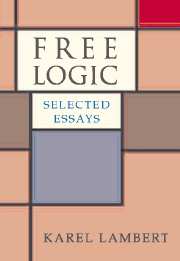
-
Select format
-
- Publisher:
- Cambridge University Press
- Publication date:
- 05 June 2012
- 31 October 2002
- ISBN:
- 9781139165068
- 9780521818162
- 9780521039222
- Dimensions:
- (228 x 152 mm)
- Weight & Pages:
- 0.42kg, 204 Pages
- Dimensions:
- (228 x 152 mm)
- Weight & Pages:
- 0.312kg, 204 Pages
You may already have access via personal or institutional login
Book description
Free logic is an important field of philosophical logic that first appeared in the 1950s. J. Karel Lambert was one of its founders and coined the term itself. The essays in this collection (written over a period of 40 years) explore the philosophical foundations of free logic and its application to areas as diverse as the philosophy of religion and computer science. Amongst the applications on offer are those to the analysis of existence statements, to definite descriptions and to partial functions. The volume contains a proof that free logics of any kind are non-extensional and then uses that proof to show that Quine's theory of predication and referential transparency must fail. The purpose of this collection is to bring an important body of work to the attention of a new generation of professional philosophers, computer scientists and mathematicians.
Reviews
‘Free logic is still very much a current concern both to logicians and to philosophical logicians and philosophers of language and mathematics … I cannot but believe that the proposed collection will have anything but a major impact and would be invaluable as a teaching aid at intermediate and advanced level as well as professional research interest.’
Peter Clark - University of St. Andrews
‘These essays will be seen to be even more important once mathematicians and software engineers realize that what they thought was new and novel to their fields (E-logic and E+-logic and the various other names that these logics go by in mathematics and computer science) are varieties of free logic and were first discovered 30-45 years ago.’
Raymond Gumb - University of Massachusetts, Lowell
Contents
Metrics
Altmetric attention score
Full text views
Full text views help Loading metrics...
Loading metrics...
* Views captured on Cambridge Core between #date#. This data will be updated every 24 hours.
Usage data cannot currently be displayed.
Accessibility standard: Unknown
Why this information is here
This section outlines the accessibility features of this content - including support for screen readers, full keyboard navigation and high-contrast display options. This may not be relevant for you.
Accessibility Information
Accessibility compliance for the PDF of this book is currently unknown and may be updated in the future.


